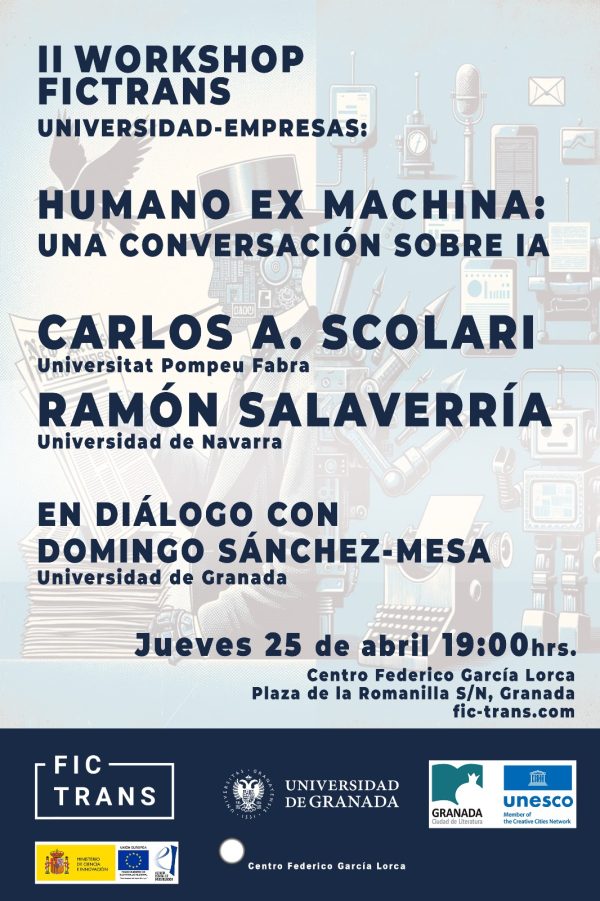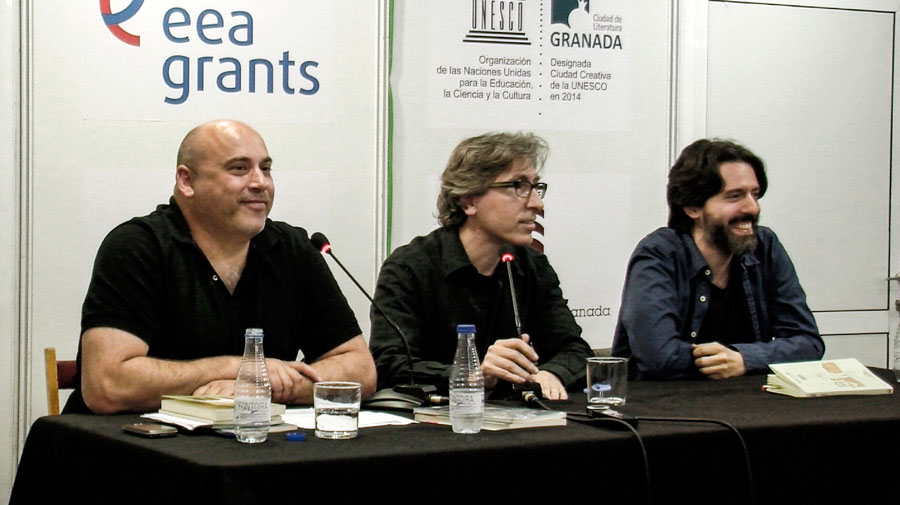Days of Tribute to Luis Alberto de Cuenca
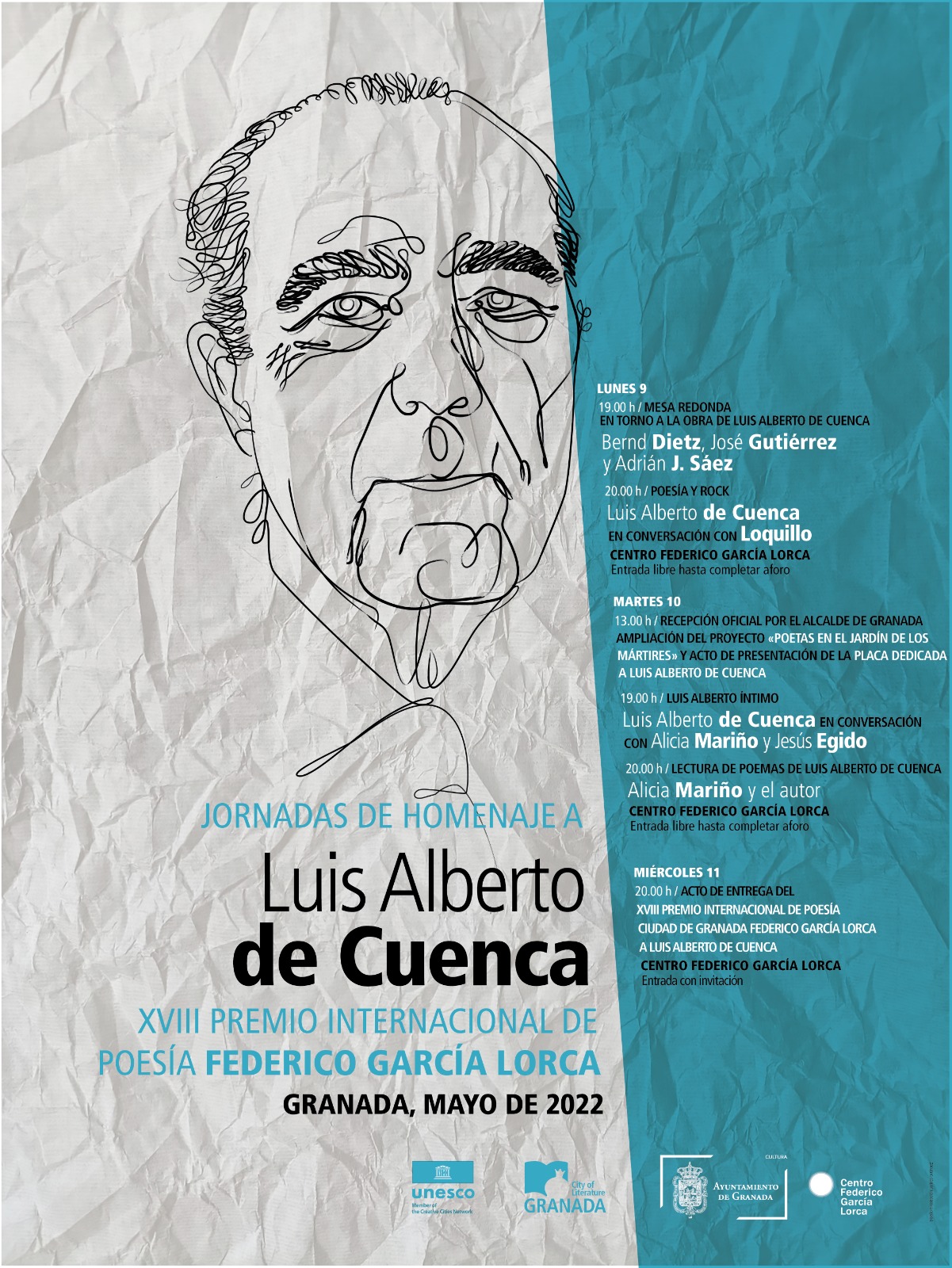
IMPORTANT: The conversation “Poetry and Rock” between Loquillo and Luis Alberto de Cuenca happens to be held on Monday, May 9, at 20:00 h, at the Centro Federico García Lorca. Free entrance until full capacity.
he Granada City Council, through the Granada City of Literature UNESCO Programme of its Arts Department, organizes the Days of Tribute to Luis Alberto de Cuenca, winner of the XVIII Ciudad de Granada-Federico García Lorca Internacional Poetry Prize. The tribute will be held on May 9 and 10, 2022 at the Federico García Lorca Center. The solemn act of the award ceremony will be on May 11.
The days of tribute to Luis Alberto de Cuenca aims to offer citizens a brief and stimulating tour of the life and work of him, one of the great figures of poetry in Spanish language, with the aim of spreading it to all kinds of audiences.
For this reason, artists, writers and intellectuals who maintain a friendly relationship with the poet will participate in the conference. A round table will be held in which outstanding specialists will talk about the work of Luis Alberto de Cuenca and a reading of poems by Luis Alberto and Alicia Mariño. In addition, we will continue with the cycle of conversations on not very known aspects of the personal life of the winner of the Federico García Lorca Award, cycle that we already celebrated in 2018 with “Gimferrer íntimo” and in 2019 with “Jaramillo íntimo” and that we continue in 2022 with “Luis Alberto íntimo”, in which the poet Alicia Mariño and the editor of Reino de Cordelia, Jesús Egido, will talk with the poet in an accomplice and relaxed atmosphere. The conference will close with a conversation between Luis Alberto de Cuenca and the legendary rocker Loquillo.
In addition to the events held at the Centro Federico García Lorca, on Tuesday, May 10, from 1 pm, Luis Alberto de Cuenca will attend the Carmen de los Mártires, where he will be received by the Mayor of Granada, and where it will inaugurate the project of extension of the route of poetic plates that runs along the Garden of the Carmen de los Mártires with verses of the winners of all the editions of the Ciudad de Granada-Federico García Lorca Poetry Prize.
DAYS OF TRIBUTE TO LUIS ALBERTO DE CUENCA
XVIII Federico García Lorca International Poetry Prize
Granada, May 2022
MONDAY, MAY 9
7 pm | Round table on the work of Luis Alberto de Cuenca
JOSÉ GUTIÉRREZ, ADRIÁN J. SAÉZ and BERND DIETZ
8 pm | Poesía and Rock
LUIS ALBERTO DE CUENCA in conversation with LOQUILLO
Centro Federico García Lorca / Free entrance until full capacity
TUESDAY, MAY 10
1 pm | Official reception by the Mayor of Granada to Luis Alberto de Cuenca |
Extension of the project “Poetas en el Jardín de los Mártires” y and presentation of the plaque dedicated to Luis Alberto de Cuenca
Carmen de los Mártires / Free entrance until full capacity
7 pm | Luis Alberto íntimo
LUIS ALBERTO DE CUENCA in conversation with ALICIA MARIÑO and JESÚS EGIDO
8 pm | Reading poems
ALICIA MARIÑO and LUIS ALBERTO DE CUENCA
Centro Federico García Lorca / Free entrance until full capacity
WEDNESDAY, MAY 11
8 pm | Ceremony of the XVIII Ciudad de Granada-Federico García Lorca International Poetry Prize to Luis Alberto de Cuenca
Centro Federico García Lorca / Admission: with invitation
Luis Alberto de Cuenca
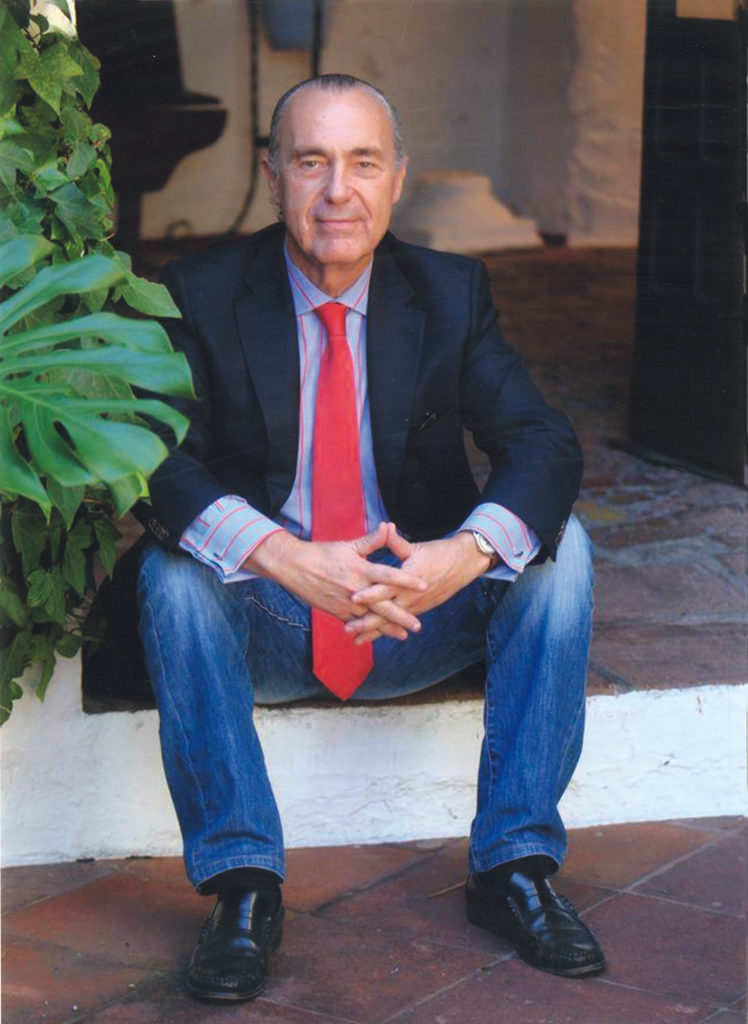
© Miguel Palop
Luis Alberto de Cuenca (Madrid, 1950)
A poet, translator and essayist, he is a professor of research at the CSIC, a number academic at the Real Academia de la Historia and a corresponding academic at the Academia de Buenas Letras of Granada. He was director of the National Library between 1996 and 2000, and today presides over its Real Patronato. He has won the Poetry Critic Award in 1986 (for La caja de plata), the National Poetry Prize in 2014 (for Cuaderno de vacaciones) and the National Translation Prize in 1989, among many other awards. His poetry books include El otro sueño (Sevilla, 1987), El hacha y la rosa (Sevilla, 1993), El reino blanco (Madrid, 2010), La mujer y el vampiro (Madrid, 2010) and Cuaderno de vacaciones (Madrid, 2014), work collected in anthologies such as Los mundos y los días (1998), Mitologías (2001) and De amor y amargura (2003). He has also worked on the translation of authors such as Homer, Euripides, Callimachus, Chrétien de Troyes, Shakespeare, Marcel Schwob or Kavafis, among many others. In 2021 he was awarded the XVIII Ciudad de Granada-Federico García Lorca International Poetry Prize.
Guests

Loquillo (Barcelona, 1960)
José María Sanz Beltrán, Loquillo, started as a rocker in 1980 with the group Loquillo y los Intocables. From 1983 to 2007, he consolidated his career with Loquillo y los Trogloditas. Since 2007, he started his solo career. For his first album as Loquillo, Balmoral, was nominated for the Latin Grammy in 2008.
He edited two albums of poems, with music and adaptation by Gabriel Sopeña: La vida por delante and Con elegancia, where he voices works by poets of the caliber of Octavio Paz, Pablo Neruda, Pedro Salinas or Jaime Gil de Biedma among others. In 2011 he released an album with music poems by Luis Alberto de Cuenca titled Su nombre era de todas las mujeres.
In addition to singing, she has played some supporting roles in films such as La ciudad de los prodigios (Mario Camus, 1999) or La buena nueva (Helena Taberna, 2008) and has participated in the BSO of Mujeres en pie de guerra and Vindication, two films directed by his sentimental partner, Susana Koska. He has also collaborated as a writer in various newspapers, and he has written two novels, El chico de la bomba (2002) and Barcelona Ciudad (2010). In 2018, and on the occasion of its 40th anniversary, it released the triple compilation CD Rock and Roll Attitude and, the same year, received the Medal of Honor of Barcelona.
In March 2022 Loquillo: the official biography was published, written by Felipe Cabrerizo.

Alicia Mariño (Cáceres, 1958)
Lawyer and PhD in French Philology, she is a full professor at UNED. She has published numerous works on fantastic literature, including those dedicated to Villiers de l’Isle-Adam, Nodier, Gautier, Maupassant, Mérimée, Barbey d’Aurevilly, Pedro Antonio de Alarcón, E.T.A. Hoffman, and Edgar Allan Poe. A regular contributor to the media, she has studied the field of women’s literature, especially authors such as George Sand and Flora Tristan, as well as the role of women in Don Quixote or in Calderón’s dramatic work. She has recently translated and adapted Time and the Conways (2011), by J. B. Priestley. Her first book of poetic creation, haikus, is Aire del tiempo (Reino de Cordelia, 2013). In these days she is about to publish an essay on Teoría de la literatura fantástica and Antología de relatos fantásticos y de terror with an extensive introduction.
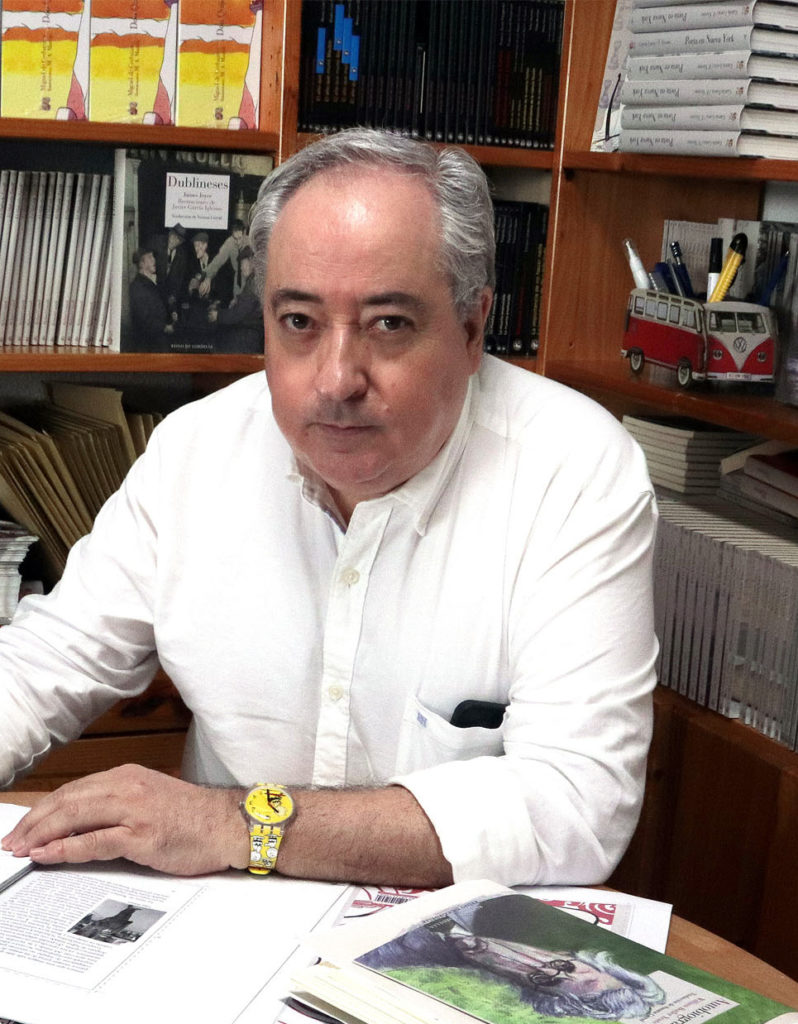
© Antonio Tiedra
Jesús Egido (Ponferrada, 1959)
He is a journalist and editor. He has been deputy director of La Crónica de León, editor-in-chief of Tribuna de Actualidad and Diario 16 and director of Madrid Económico. In 2006, he created the publishing house Rey Lear, awarded by the Ministry of Culture with two second prizes for the Best Edited Book of the Year. In 2008 he founded the publishing house Reino de Cordelia, which already has more than three hundred titles. In 2016 this label won the 1st Prize for the Best Book Published in Spain granted by the Ministry of Culture and in 2015, 2017 and 2019 another three second national awards. In 2017 the magazine Fuera de Serie awarded Jesús Egido the award for Best Editorial Work.

Bernd Dietz (Alcalá de Henares, 1953)
He has worked as a professor of English and North American literature at the universities of La Laguna (1986-1996) and Córdoba (1996-2013). He has published poetry, literary criticism, essays and translations of English and German classics. He has directed various cultural associations and publications, such as La Manzana Poética, and coordinated numerous poetry activities for the Cordoba Council City. He also cultivates political and cultural columnism. In recent years he has been interested in Judaism and political philosophy. He presides over the Liberal Circle of Andalusia.
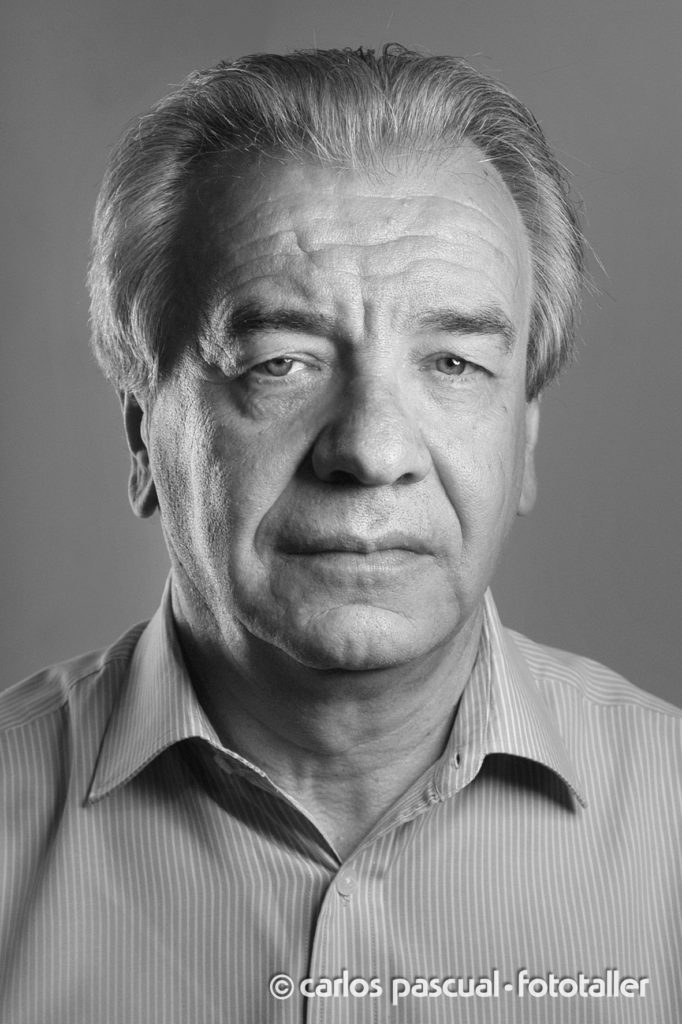
© Carlos Pascual
José Gutiérrez (Nigüelas, Granada, 1955)
He is the author of the books of poems Ofrenda en la memoria (1976), El cerco de la luz (1978), Espejo y laberinto (1978), La armadura de sal (1980), De la renuncia (1989, 2nd ed. 2010; and bilingual edition in France: Du renoncement, 2010), La tempestad serena (2006), and the anthologies Poemas 1976-1996 (1997), Islas de claridad (2015) and Antes de la Renuncia (2019). It has been included in anthologies such as Las voces y los ecos (1980), Florilegium. Poesía última española (1982), Postnovísimos (1986) or Poesía española reciente 1980-2000 (2001). He has co-directed the collections: Silene and Ánade de poesía.
In the field of essays, he is the author of Introducción a la pintura de José Hernández Quero (1986), Manual de nostalgias: invitación a la poesía de Elena Martín Vivaldi (1982), poet of whose work he prepared and prologued the edition of the poetic anthology En plenitud de asombro (2002) and the miscellaneous volume Nueva luz sobre antiguos libros (2014). He created and directed the cultural magazine El Fingidor of the University of Granada, where he worked, from 1976 to 2020, in editorial, cultural and journalistic tasks. He is a member of the Academia de Buenas Letras of Granada.

Adrián J. Sáez (San Sebastián, 1988)
Professor of Spanish literature at the Università Ca’ Foscari Venezia (since 2018), holds a PhD from the University of Navarra (2013) and the Université de Neuchâtel (2017), has worked at the Universität Münster and the Universität Heidelberg (Germany) thanks respectively to the Horstmann Prize and a Mercator fellowship. He has dealt with Calderón, Cervantes, Lope, Quevedo and Luis Alberto de Cuenca, as well as the relationship between literature and art, geography and diplomacy, among other issues of the Golden Age. Some of his publications are El ingenio del arte: la pintura en la poesía de Quevedo (2015), Godos de papel: identidad nacional y reescritura en el Siglo de Oro (2019), Desde Italia con amor: Aretino en la poesía española del Siglo de Oro (2021) and El teatro de Miguel de Cervantes (with I. García Aguilar and L. Gómez Canseco, 2016), as well as the editions of La devoción de la cruz de Calderón (2014), Pedro de Urdemalas (2016), the Poesías (2016), La tía fingida (2018), and the Entremeses (2020), by Cervantes, El primer rey de Castilla (in Parte XVII, 2018), by Lope de Vega, and the Coloquio de las damas and the Sonetos lujurioso (2021), by Aretino. He is editor of El hacha y la rosa by Luis Alberto de Cuenca (Reino de Cordelia, 2020) and director of the Critical Library Luis Alberto de Cuenca (Renacimiento). He has in press an anthology of Quevedo (with F. Plata).

